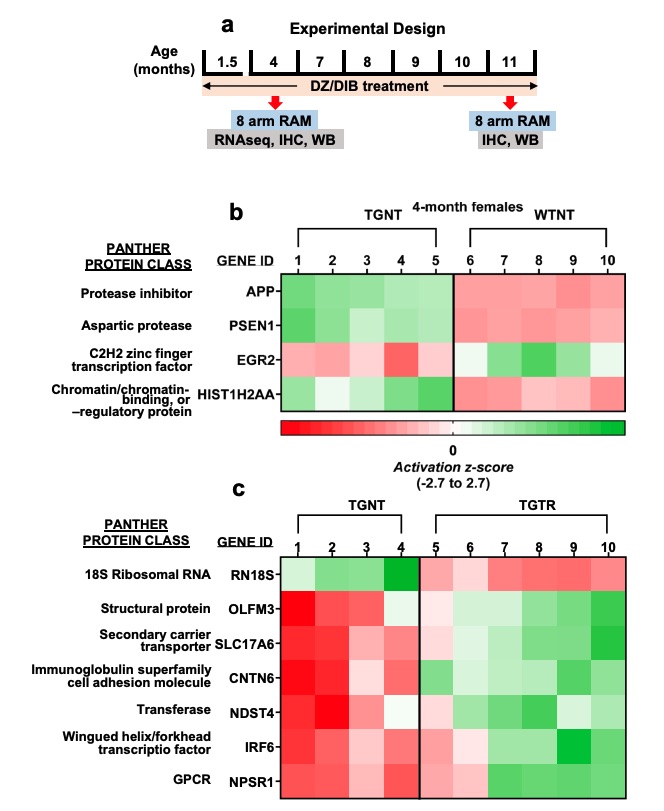Alzheimer’s Disease (AD) Modeling & Pharmacodynamics Services
Murine models of Alzheimer's Disease (AD) have played an important role in providing significant insight into the underlying mechanisms and are still currently the most commonly used in vivo tool for screening in preclinical drug trials. Creative Biolabs offers preclinical screening and evaluation services with your drug candidates in various AD models including chemically-induced models and genetically engineered models. We can work with our clients to provide expert scientific guidance, flexible customized study design, a wide range of behavioral tests and histopathology analysis, and will assist you with the interpretation of the data.
 Fig. 1 RNAseq heatmaps showing transcriptional changes in WT and TG-AD rats.1
Fig. 1 RNAseq heatmaps showing transcriptional changes in WT and TG-AD rats.1
Introduction of Alzheimer's Disease
AD is the most common form of human neurodegenerative disease leading to senile dementia. Generally, there are two forms of AD: early-onset AD and late-onset AD. On one hand, the early onset form is defined as occurring before 65 years of age and is commonly caused by dominant mutations in one of the three genes, the PSEN1, PSEN2, and APP genes. This type accounts for less than 1% of AD cases. On the other hand, the common, late-onset form of AD occurs from 65 years of age and is frequently regarded as "sporadic" without obvious familial inheritance. But evidence has shown that mutations in the above three genes can increase the risk of the late-onset AD. Clinically pathological alterations including neuronal loss, gliosis, synaptic loss, changes in long-term potential/long-term depression (LTP/LTD) occur with the progression of the disease. Amyloid beta (Aβ) plaques, neurofibrillary tangles (NFTs), and cognitive impairment are the main diagnostic evidences of AD.
Scopolamine-Induced Amnesia Model (Mice & Rat)
Scopolamine, a muscarinic antagonist, interferes with memory in animals and humans, particularly the processes of learning acquisition and short-term memory. Scopolamine-treated animals and human subjects exhibit memory dysfunctions analogous to those observed in demented patients. This model has been regarded as a suitable animal model to test for drugs with potential therapeutic benefits in dementia, learning and memory impairment. Creative Biolabs conducts contract studies in established scopolamine-induced amnesia rodent models to facilitate research and the development of compounds for the AD as well as other diseases with a negative impact on memory and cognitive functions.
Studies have revealed that the primary pathology associated with the AD is the formation of abnormal metabolic products of Aβ protein. The Aβ aggregates located around neurons not only have a direct toxic effect on the neurons but also enhance the susceptibility of neuronal cells to free radicals, nerve toxins, and other harmful factors, leading to widespread degeneration and the loss of functional neurons, and ultimately memory and cognitive decline. In this model, the AD is induced via intracerebroventricular (I.C.V) injection with Aβ oligomers, which are small assemblies or aggregations of the Aβ protein.
Streptozotocin (STZ)-Induced AD Model
Single or double STZ-ICV injection(s) chronically decrease cerebral glucose uptake and produce multiple other effects that resemble molecular, pathological, and behavioral features of the AD, including memory impairment, progressive cholinergic impairment, neurodegeneration, etc. Thus, it has been explored as a non-transgenic model of the AD and used for preclinical testing of pharmacological therapies for this disease.
Genetically Engineered Models of AD
Additionally, supported by our advanced genetically engineering platform, we also offer services specific to your needs by conducting efficacy studies with your investigative compounds in transgenic mouse models such as:
- Mouse models expressing mutant amyloid precursor protein (APP, Swedish K670/671L)
- Mouse models expressing mutant microtubule-associated protein tau gene (MAPT, human P301L)
- Mouse models expressing mutant Psen1
- Mouse models expressing mutant Apoe
- 5XFAD mice
At Creative Biolabs, you will find the most comprehensive neurological preclinical drug efficacy testing services. Our neurological disease models are listed as follows:
We help our clients to choose the most suitable models for testing your compounds and to respond to our clients' needs, we provide customized protocol and study designs. If you are interested in our services, please contact us to discuss your research needs.
Reference
- Wallace, Charles H., et al. "Potential Alzheimer's early biomarkers in a transgenic rat model and benefits of diazoxide/dibenzoylmethane co-treatment on spatial memory and AD-pathology." Scientific Reports 14.1 (2024): 3730. Distributed under Open Access license CC BY 4.0, without modification.
For Research Use Only.
